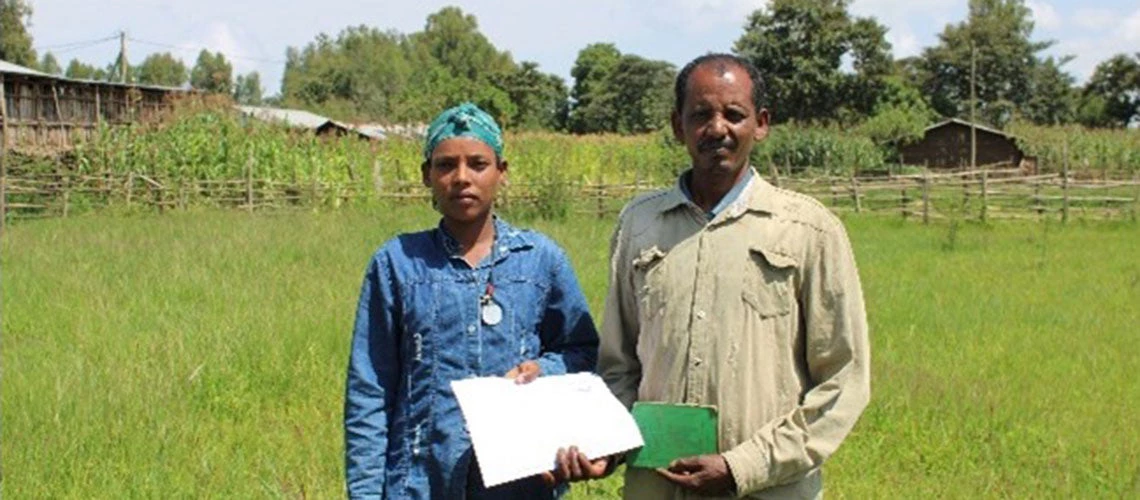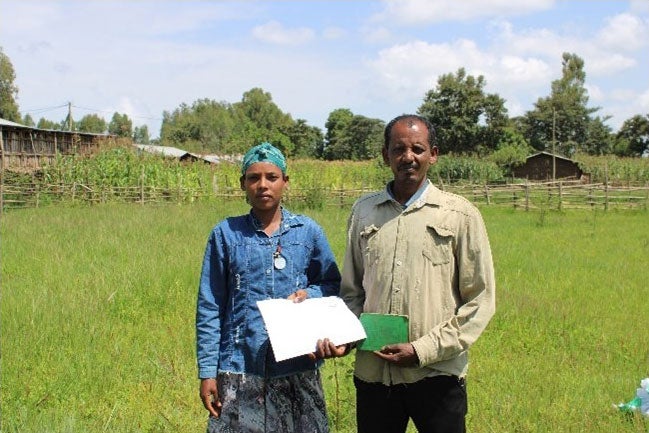 Addise Grimaw and Abi Alamirew, a small holder farming couple, from Dangla Woreda of Amhara Region with their certification for second level landholding. Photo: CALM Program, Ethiopia Ministry of Agriculture
Addise Grimaw and Abi Alamirew, a small holder farming couple, from Dangla Woreda of Amhara Region with their certification for second level landholding. Photo: CALM Program, Ethiopia Ministry of Agriculture
Asgedech, a farmer in the Ethiopian highlands, has several decisions to make to ensure her crops thrive despite shifts in climate. Should she follow the extension worker’s advice and invest in making soil bunds on the half acre piece of farmland she cultivates? Will it be worth the additional time and effort she will have to put in? Will it be wise to make the required investments especially as she does not have secure tenure to the land she cultivates? For Asgedech, and small farmers like her who are facing the challenges of climate change, , making choices such as these is not easy.
Climate change context in Ethiopia
Ethiopia has a diverse climate and landscape but is considered largely arid. The key climate trends in the country have seen an increase in average temperatures and decline in precipitation associated with higher evapotranspiration, reduced soil moisture, and a greater incidence of droughts and floods. High dependence on rain-fed agriculture and relatively low adaptive capacity makes Ethiopia one of the most vulnerable countries to climate change. Combined with environmental problems such as soil erosion, deforestation, desertification, land degradation and loss of biodiversity, this contributes to adverse impacts on livelihoods.
People living in already degraded areas are increasingly negatively affected by climate change. Climate change impacts are not gender neutral; women and girls are disproportionately impacted by climate change, and often face economic, social and political barriers that limit their ability to cope with shocks. Women, who make up more than 40% of the agriculture labor force and head approximately 25% of all farming households in the country, are among the highest risk groups. Women farmers are more exposed to climate risks compared to men as they have fewer endowments and assets, have less access to information and services, and are less mobile. Gender-based differences demands on time, for example for providing childcare and barriers to accessing financial services further constrain women’s opportunities for economic activity and their participation in decision making. In spite of their vulnerability, women are also active and effective agents and promoters of climate adaptation.
World Bank support to Ethiopia’s initiatives for climate change adaptation
Under-developed water resources, low economic development, inadequate infrastructure in drought prone areas, weak institutional structures, and lack of awareness challenge Ethiopia’s adaptive capacity.
Sustainable land management (SLM) can build climate change resilience and boost local livelihoods. Ethiopia has made significant progress over the past decade and a half to restore degraded lands and build adaptive capacity through SLM. The World Bank has been supporting these efforts through multiple projects including the now completed Sustainable Land Management Project, and more recently, the Climate Action through Landscape Management Program (CALM) and the Resilient Landscapes and Livelihoods Projects (RLLP) .
The CALM seeks to increase adoption of SLM practices, expand access to secure land tenure in non-rangeland rural areas, and is investing in participatory watershed management and rural land administration. The CALM Program has so far brought 500,000 hectares out of a planned 2,500,000 hectares under SLM.
The RLLP focuses on improving climate resilience, land productivity and carbon storage, increasing access to diversified livelihood activities, and is investing in increasing adaptive capacity of rural smallholders in 217 watersheds. The RLLP has so far supported about 68,400 women land users and 15,800 female headed households to adopt SLM practices.

Empowering women with land tenure for sustainable land management
Insecure land tenure affects the ability of farmers to make long-term investments on land that can potentially advance adaptation and mitigation. Secure tenure through land certification is understood to have a positive correlation for household participation in SLM initiatives. The sense of permanence that comes with secure land tenure provides households with the incentive to invest in SLM, not just on their own land, but at community-level, beyond their own farms. There is evidence of small holder farmers investing in soil and moisture conservation measures, longer-rotation crops and tree plantations as a consequence of securing land tenure through certification. These investments have positive income effects and contribute to enhancing the farmers’ adaptive capacity.
An important intervention in both the CALM and RLLP projects is the provision of land tenure to smallholder women farmers in watersheds through Second Level Landholding Certification (SLLC). In the CALM Program, the share of registered landholdings held by women, individually or jointly with a man, is currently 78%, against an end target of 81%. In the RLLP, about 511,800 women have received SLLCs so far – individually or jointly. Also, about 7,700 female landless youth who are members of groups have also been issued SLLCs or legal documentation to use communal land holdings in exchange for restoring land.
Securing land tenure for women farmers is the beginning. Building climate adaption capacity will require empowering them to operationalize SLM on their land. Both the CALM and RLLP address this through multiple interventions including participatory planning, extension support, capacity building, community institution building, etc., - so that we #AccelerateEquality, and farmers like Asgedech will be able to make sound decisions about managing their land sustainably.
References:
- Climate Risk Profile: Ethiopia (2021): The World Bank Group.
- IPCC, 2019: Summary for Policymakers. In: Climate Change and Land: an IPCC special report on climate change, desertification, land degradation, sustainable land management, food security, and greenhouse gas fluxes in terrestrial ecosystems
- World Bank, FAO & IFAD. 2015. Gender in climate-smart agriculture: module 18 for gender in agriculture sourcebook. Agriculture global practice. Washington, D.C.: World Bank Group.
- Balgis Osman-Elasha. Women...In the Shadow of Climate Change. UN Chronicle.
- Birhanu Addisu Adamie, Land property rights and household take-up of development programs: Evidence from land certification program in Ethiopia, World Development, Volume 147, 2021, 105626, ISSN 0305-750X.
- Evidence Note. LIFT’s Study on the Impact of SLLC on Tenure Security, Investment and Incomes. LIFT. July 2021.




Join the Conversation